The pungent and peppery radish or mooli is probably one of those vegetables mothers would chase their little ones with, trying to get them to eat some of it, and not because it’s tasty but because of its immense benefits. Radishes are also called Daikonsor Raphanus Sativus and belong to brassica family that includes broccoli, cabbage, Brussels sprouts. There are several varieties of radishes available – pink, purple, black, and white. The white radish is the most common of all, with the pink coming a close second. The tiny radish root is rich in copper, calcium, magnesium, phosphorus, zinc, Vitamin B1, B2, B3, B5, B6, A, C, and K, and whatnot. Let’s explore the benefits of radish, its uses, and side effects.
Nutritional Facts Of One Cup Of
Sliced Radishes
Calories –
18.6 grams
Protein –
0.8 grams
Carbs – 4 grams
Fat – 0.1 gram
Fiber –
1.9 gram
Vitamin C – 29%
of Daily Value
Folate –
7% of Daily Value
Vitamin B6 – 4% of Daily Value
Potassium – 8% of Daily Value
Manganese–4% of Daily Value
Calcium –
3% of Daily Value
Table of Contents
Radish Benefits
1. Stimulates Digestion
Radishes are rich in dietary fiber and is of immense help when it comes to fixing the body’s digestive system. The fiber also helps in regulating blood sugar levels and reducing bad cholesterol. Regular intake of radishes can increase the movement in intestines, keeps our digestive system healthy, and prevents constipation. According to a study on rats, radish leaves too provide a good amount of fiber to enhance the digestive system (1).
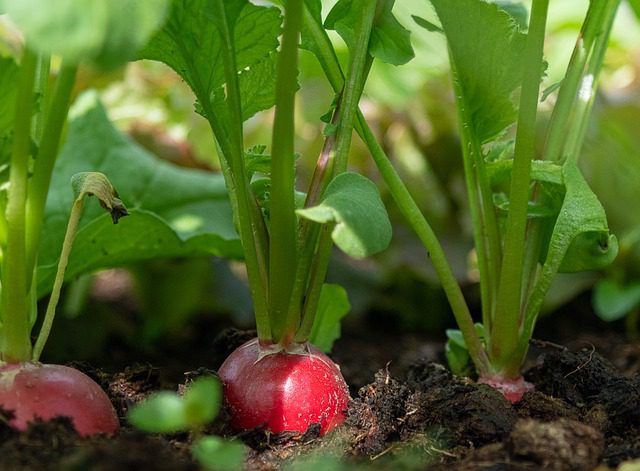
2. Can Prevent Infections
Radishes contain an anti-fungal protein called RsAFP2 which makes it a powerful anti-fungal for several infections. candida albicans is a fungus that is easily found in human bodies and can lead to oral yeast infections, vaginal yeast infections when it develops above the normal limits.
3. Strengthens Immunity
Radishes contain an array of essential nutrients such as vitamins A, B, B6, and C, and potassium and minerals – all of which are beneficial to our immunity. The anthocyanin and antioxidants in the radish promote heart-health. Vitamin C helps in collagen production, reduces oxidative stress, maintains metabolism, strengthens the blood vessels which further prevents various ailments including infections and heart diseases.
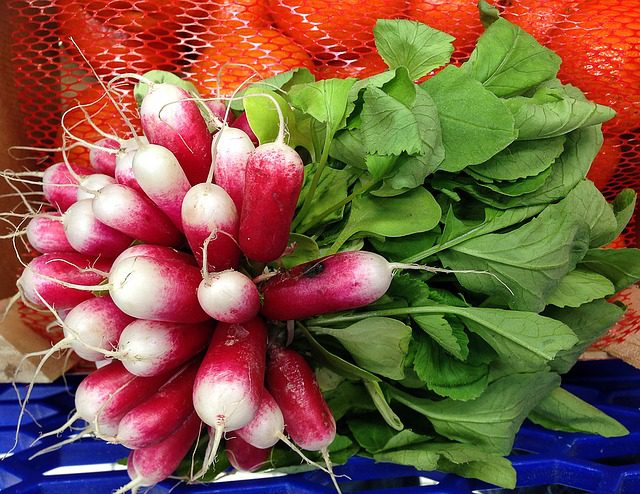
4. Helps To Cure Cough And Cold
Enriched with anti-congestive properties, radishes are able to remove mucus from your throat and the respiratory tract. They act as a disinfectant and thus can prevent infections and allergies. If you’re frequently bothered by the common cold and cough, try including this peppery root vegetable in your diet.
5. May Maintain Blood Pressure
Radishes are rich in potassium and aids in regulating one’s blood pressure. Potassium increases blood flow and helps in the widening of the walls of the blood vessels. It maintains the balance between potassium and sodium as well as works as an anti-hypertensive agent and prevents hypertension. Being low in Glycemic Index (GI), it regulates the sugar absorption in bloodstreams. White radishes are rich in Nitric Oxide, which can also reduce BP and that further lowers the risk of heart diseases.
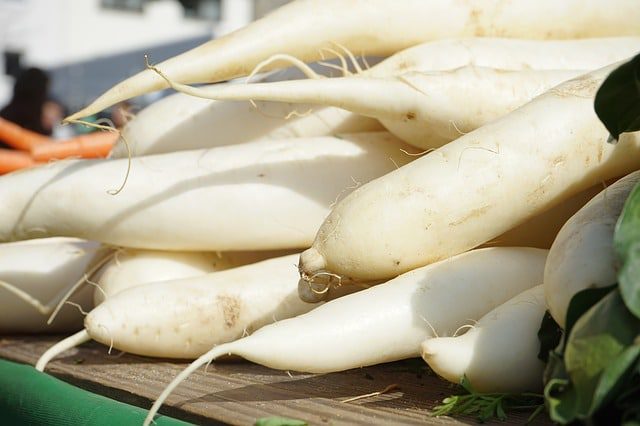
6. Can Help In The Cure Of Jaundice
Radish leaves are considered a powerful remedy for jaundice. They help in detoxification, purification of blood and expelling harmful toxins from the body. Radishes eliminate Bilirubin, which is responsible for the yellowing of the eyes, skin and the mucous membranes. Furthermore, it reduces the distribution of red blood cells and increases fresh oxygen supply in the blood. Black radishes are especially recommended during jaundice for purifying blood and removing excess Bilirubin.
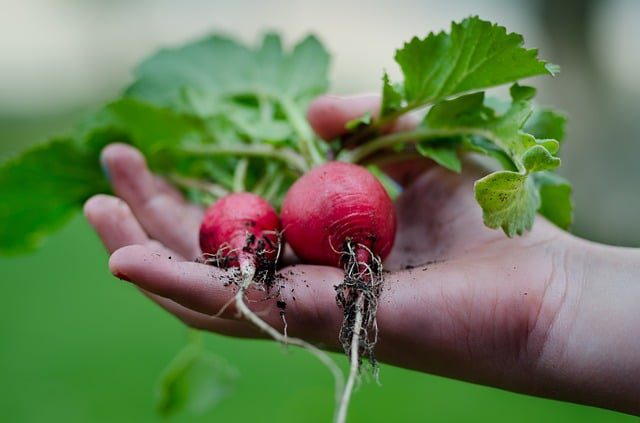
7. Beneficial During Urinary Disorders
Radishes have diuretic properties. Radishes are good for detoxifying the kidneys through urine. It also eliminates calcium oxalate and reduces inflammation and the burning sensation during urinating. Additionally, the radish prevents several urine-related infections and disorders such as the development of stones. But if you do have a severe infection or stones, please consult a doctor before doing anything.
8. Aids In Heart-Health
The anti-inflammatory properties in radishes can prevent heart failure, peripheral artery disease, and kidney disorders. Radishes have plenty of trigonelline and bio-active compounds that boost the production of Nitric Oxide, which in turn comforts muscle tissues, stimulates blood flow, and lowers the chances of arthrosclerosis. Additionally, Anthocyanins circulates metabolites by reducing oxidative stress and inflammation. A study shows that Sakurajimadaikon or monster radish can help to curb heart diseases and stroke (2).
Also Read : The List Of Anti-Inflammatory Foods.
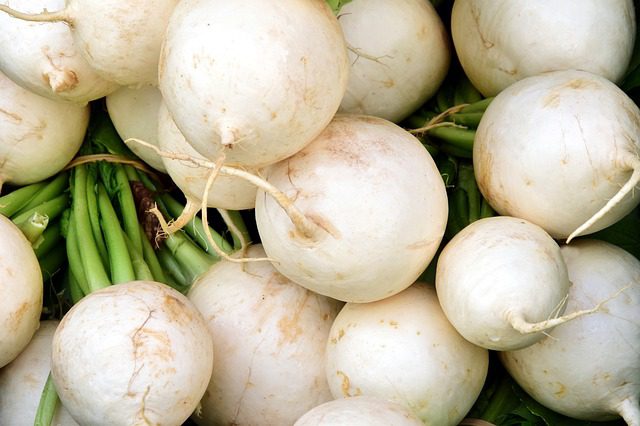
9. May Ward Off Cancer
The powerful combination of vitamin C, Anthocyanins, antioxidants and folic acid helps in altering the genetic pathways of cancer cells and apoptosis. According to linus Panling Institute, cruciferous vegetables contain compounds that are broken down into Isothiocyoncin when combined with water. Isothiocyoncin in turn helps to remove cancer-causing substances from the body and also prevents the development of tumor. A study shows that the abundance of antioxidants and bio-active compounds in the radish can control various types of cancers and diabetes (3).
10. Helps To Control Diabetes
Radishes have low Glycemic Index, which controls the blood-glucose levels in the body. Radishes also increase metabolism and glucose absorption in the body, and Catechins found in radishes help in the production of insulin and regulate its response.
A study shows the effectiveness of radishes during diabetes. Although more research is needed on the effects of radish seeds and leaves, the benefits of the radish itself show a lot of promise when it comes to controlling diabetes (4).
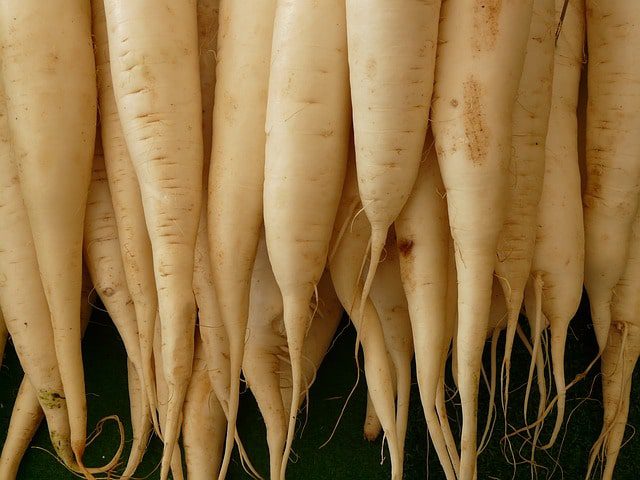
11. Aids In Weight Loss
Radishes are packed with roughage, fiber, water, low digestive carbohydrates, and few calories. Radishes make you feel full for longer and thus prevent random cravings. Furthermore, the diuretic property in radishes lowers fluid retention and maintains the blood sugar levels that are helpful in appetite control.
12. Improves Skin Health
Did you know that this crunchy root can do wonders for your skin as well? Radishes contain 95% of water that keeps our skin hydrated. Being rich in vitamin C, a radish can neutralize free radicals and repair damaged skin cells. Its disinfectant properties can control skin problems such as rashes and cracks. Furthermore, the zinc and phosphorus in it prevent dryness and acne.
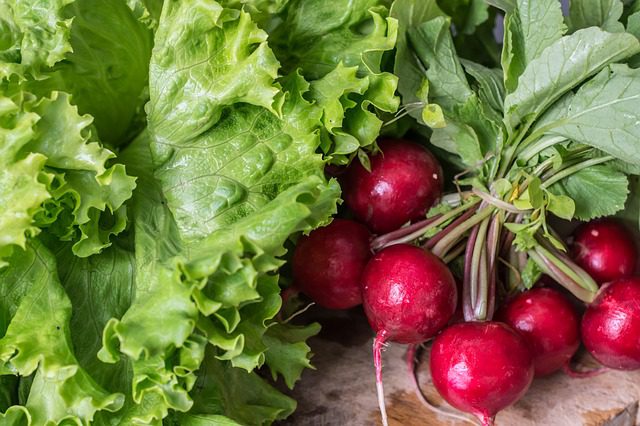
13. May Keep Hair Problems At Bay
Due to its various nutritional values, radishes are used to fix various hair-related problems. Radishes are a storehouse for vitamins A, C and K, all of which enhance the growth of hair. Additionally, the presence of iron also aids in the improvement of hair-health. Eating radishes regularly can also keep dandruff at bay.
Uses Of Radish
1. Salad
Salads are the most common way of eating radish but you can try different ways to make them just to avoid getting bored. Take some radish, butter lettuce and cheese and toss it around nicely. Add a bit of salt and dressing, or even just some olive oil and lemon juice. Walnut and mint can also be added to enhance the flavor.

2. Burgers
A good vegetable burger can be as good as one with meat. But thinly sliced radishes, along with lettuce and tomato, can add a whole lot of flavor and crunch to your homemade vegetable burger.
3. Fruit Platter
Radishes go well with almost every citrus and soft fruit like kiwi, strawberries and oranges. Try it out!

4. Toast
Sliced radish with creamy avocado on toast is something you simply have to try at home. You can also add smoked salmon, green onions, and strawberries with it. Didn’t think of that one, did you?

5. Roasted
Radishes become sweet and crispier once they’re roasted. If you don’t like the bitter peppery taste of this vegetable, try roasting it with carrots and potatoes.
6. Juice
If you don’t mind the pungency of the radish, put it in a blender, juice it, strain it, and drink it like a shot. You can also add a pinch of rock salt perhaps and a dash of lime juice.
How To Store Radishes?
You can store radishes in the refrigerator in a sealed bag for 5-7 days. Winter radishes can be stored for up to 2 weeks. It’s advised to remove all the leaves from the radish before storing them; leaves can cause in the loss of moisture and nutrition over time.
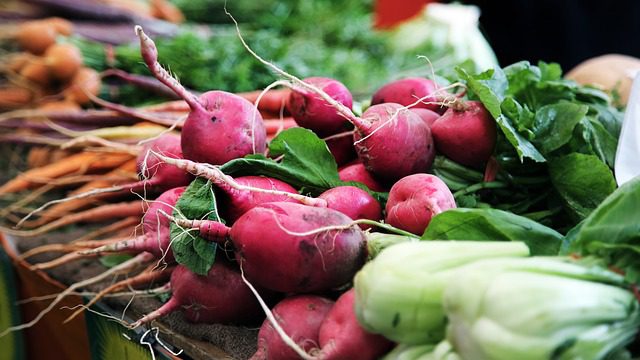
Side-Effects Of Radishes
Can Increase Hypothyroidism
Cruciferous vegetables contain a substance called Goitrogenic that interrupt in the production of the thyroid hormone. So talk to your doctor before including the radish in your diet, especially if you have hypothyroidism.
May lead To Hypoglycaemia
Radishes can significantly lower blood sugar levels in the body and too much of it can reduce below what’s normal. So if you already suffer from low blood sugar, talk to your doctor before eating radishes regularly.
Painful In Gallstones
Radishes increase the flow of bile. Therefore those with gallstones can be subjected to sudden pain because those stones block the bile duct. So unless and until you’re free of gallstones, keeping away from radishes is advised. Or just have a chat with your doctor.
Conclusion
Rich in nutrients and antioxidants, which help our bodies in more ways than one, the humble radish is not one to be ignored. From controlling diabetes to promoting heart-health and even looking after your skin and hair, it’s one of those rare vegetables that give you a lot more than you bargained for.


